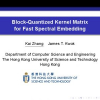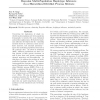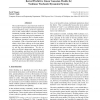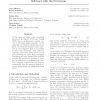111
Voted
ICML
2006
IEEE
16 years 3 months ago
2006
IEEE
113
Voted
ICML
2006
IEEE
16 years 3 months ago
2006
IEEE
Ordinal regression has become an effective way of learning user preferences, but most of research only focuses on single regression problem. In this paper we introduce collaborati...
116
Voted
ICML
2006
IEEE
16 years 3 months ago
2006
IEEE
This paper considers the problem of selecting the most informative experiments x to get measurements y for learning a regression model y = f(x). We propose a novel and simple conc...
105
Voted
ICML
2006
IEEE
16 years 3 months ago
2006
IEEE
The problem of nonlinear dimensionality reduction is considered. We focus on problems where prior information is available, namely, semi-supervised dimensionality reduction. It is...
94
Voted
ICML
2006
IEEE
16 years 3 months ago
2006
IEEE
123
Voted
ICML
2006
IEEE
16 years 3 months ago
2006
IEEE
Many algorithms have been proposed for the problem of time series classification. However, it is clear that one-nearest-neighbor with Dynamic Time Warping (DTW) distance is except...
117
Voted
ICML
2006
IEEE
16 years 3 months ago
2006
IEEE
113
Voted
ICML
2006
IEEE
16 years 3 months ago
2006
IEEE
The recent Predictive Linear Gaussian model (or PLG) improves upon traditional linear dynamical system models by using a predictive representation of state, which makes consistent...
92
Voted
ICML
2006
IEEE
16 years 3 months ago
2006
IEEE
In this paper we study a new framework introduced by Vapnik (1998) and Vapnik (2006) that is an alternative capacity concept to the large margin approach. In the particular case o...
107
Voted
ICML
2006
IEEE
16 years 3 months ago
2006
IEEE
We consider boosting algorithms that maintain a distribution over a set of examples. At each iteration a weak hypothesis is received and the distribution is updated. We motivate t...




